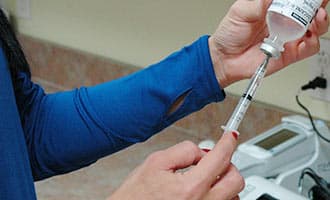
Medical errors in hospitals and doctor’s offices kill anywhere between 210,000 and 440,000 Americans each year, according to NASA’s chief toxicologist’s report in 2013. In fact, medical errors are the nation’s third largest killer, right after heart disease and cancer. The Wall Street Journal, in an editorial published May 17, stated that the number of hospital-acquired conditions and deaths dropped by 17 percent from 2010 to 2014. But that report by the Agency for Healthcare Research and Quality did not include diagnostic errors that occur in outpatient settings causing about 100,000 deaths per year. These are the types of errors that give rise to medical malpractice lawsuits.
What Will Prevent Medical Errors?
Preventing medical errors can be quite a challenge. But here are the four most common types of mistakes made in a hospital setting, which could be prevented.
- Errors Caused by Miscommunication: Lack of proper communication that occurs during shift changes, for example, can be prevented by adopting “structured handoffs” that categorize the patient’s severity of illness, medical actions and crisis contingency planning. Such handoffs leave little room for guesses or mistakes. Patient histories, lab results and prescribed medications for patients should be available to all medical professionals who attend to the patient. This could help cut down on errors made due to miscommunication.
 Medication Mistakes: In addition to nurses making hospital rounds with doctors, it is now suggested that pharmacists do so as well to prevent the burgeoning number of medication errors that kill thousands of Americans each year. Putting pharmacists in hospitals decreased errors by 45 percent and cut mistakes leading to death or severe harm by as much as 94 percent, a 2001 study stated.
Medication Mistakes: In addition to nurses making hospital rounds with doctors, it is now suggested that pharmacists do so as well to prevent the burgeoning number of medication errors that kill thousands of Americans each year. Putting pharmacists in hospitals decreased errors by 45 percent and cut mistakes leading to death or severe harm by as much as 94 percent, a 2001 study stated.- Deaths Caused by Infections: According to the U.S. Centers for Disease Control and Prevention (CDC), roughly 700,000 patients become infected while hospitalized and about 75,000 end up dying as a result. Infection control should become a must for every hospital at all times, not just during major outbreaks.
- Diagnostic Errors: These come in different forms including misdiagnosis, delayed diagnosis and failure to diagnose. These types of errors could occur as the result of incompetency, lack of knowledge or absence of teamwork. Physicians should be able to work with other specialists to ensure that the correct tests are ordered and the proper diagnosis is made.
Contact a Rhode Island Medical Malpractice Lawyer
 If you or someone you know has been injured because of medical malpractice in Rhode Island, contact us, as we work with experienced Rhode Island medical malpractice lawyers. You may be entitled to receive compensation for your medical bills, lost income and pain and suffering, among other losses. No fees are received unless you win your case. For a free (no obligation) case evaluation toll free at 1-800-992-6878. You may also fill out our contact form online.
If you or someone you know has been injured because of medical malpractice in Rhode Island, contact us, as we work with experienced Rhode Island medical malpractice lawyers. You may be entitled to receive compensation for your medical bills, lost income and pain and suffering, among other losses. No fees are received unless you win your case. For a free (no obligation) case evaluation toll free at 1-800-992-6878. You may also fill out our contact form online.
Source: http://www.wsj.com/articles/how-to-make-hospitals-less-deadly-1463526075



Social Security Disability
RI Social Security Disability
MA Social Security Disability